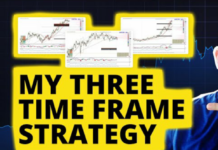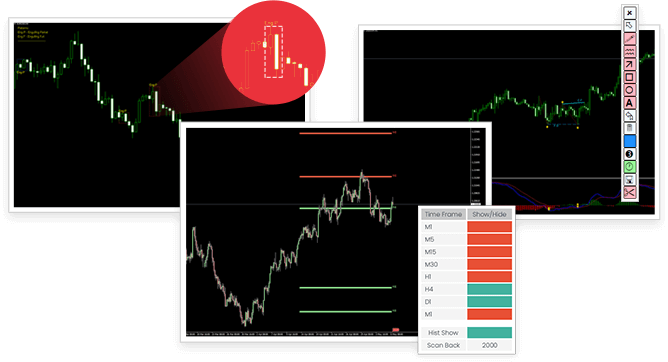
I’ve been receiving a lot of emails lately regarding spread betting from followers and I’ve decided to put together this article in an attempt to try and explain what is it and how is it different from the traditional trading.
I’m looking forward additional questions that may arise from this article, so either drop a line in the comment section or use the “live” chat that you can access by clicking the bubble in the bottom left side of the home page.
How Did Spread Betting Start?
Spread betting was invented by Charles K. McNeil, a mathematics teacher from Connecticut who became a bookmaker in Chicago in the 1940s.[4]
In North America, the gambler usually wagers that the difference between the scores of two teams will be less than or greater than the value specified by the bookmaker. An example:
- The bookmaker advertises a spread of 4 points in a certain game;
- If the gambler bets on the “underdog”, they are said to take the points and will win if the underdog’s score plus the spread is greater than the favorite’s score.
- The eventual score is Underdog 8, Favorite 10: 8 + 4 > 10, so the gambler wins;
- The eventual score is Underdog 8, Favorite 13: 8 + 4 < 13, so the gambler loses.
- If the gambler bets on the “favorite”, they give the points (sometimes called lay the points) and will win if the favorite’s score minus the spread is greater than the underdog’s score:
- The eventual score is Underdog 5, Favorite 10: 10 – 4 > 5, so the gambler wins;
- The eventual score is Underdog 8, Favorite 10: 10 – 4 < 8, so the gambler loses.
- Ties aka “Push”
- The eventual score is Underdog 9, Favorite 13: 9 + 4 = 13, so the gambler ties “pushes”. The reverse is also the same the gambler takes the favorite and it is 13 – 4 = 9
- If the gambler bets on the “underdog”, they are said to take the points and will win if the underdog’s score plus the spread is greater than the favorite’s score.
Spreads are frequently, though not always, specified in half-point fractions to eliminate the possibility of a tie, known as a push.
In the event of a push, the game is considered no action, and no money is won or lost.
However, this is not a desirable outcome for the sportsbook, as they are forced to refund every bet, and although both the book and its bettors will be even, if the cost of overhead is taken into account, the book has actually lost money by taking bets on the event.
Sportsbooks are generally permitted to state “ties win” or “ties lose” to avoid the necessity of refunding every bet.
Betting on sporting events has long been the most popular form of spread betting. Whilst most bets the casino offers to players have a built-in house edge, betting on the spread offers an opportunity for the astute gambler.
When a casino accepts a spread bet, it gives the player the odds of 10 to 11, or -110.
That means that for every 11 dollars the player wagers, the player will win 10, slightly lower than an even money bet.
If team A is playing team B, the casino is not concerned with who wins the game; they are only concerned with taking an equal amount of money of both sides.
For example, if one player takes team A and the other takes team B and each wager $110 to win $100, it doesn’t matter what team wins; the casino makes money.
They take $100 of the $110 from the losing bet and pay the winner, keeping the extra $10 for themselves. This is the house edge.
The goal of the casino is to set a line that encourages an equal amount of action on both sides, thereby guaranteeing a profit.
This also explains how money can be made by the astute gambler.
If casinos set lines to encourage an equal amount of money on both sides, it sets them based on the public perception of the team, not necessarily the real strength of the teams.
Many things can affect public perception, which moves the line away from what the real line should be. This gap between the Vegas line, the real line, and differences between other sports books betting lines and spreads is where value can be found.
A teaser is a bet that alters the spread in the gambler’s favor by a predetermined margin – in American football, the teaser margin is often six points. For example, if the line is 3.5 points and bettors want to place a teaser bet on the underdog, they take 9.5 points instead; a teaser bet on the favorite would mean that the gambler takes 2.5 points instead of having to give the 3.5.
In return for the additional points, the payout if the gambler wins is less than even money, or the gambler must wager on more than one event and both events must win. In this way it is very similar to a parlay.
At some establishments, the “reverse teaser” also exists, which alters the spread against the gambler, who gets paid at more than evens if the bet wins.
Bets on the Total (Over/Under)
In addition to the spread bet, a very common “side bet” on an event is the total (commonly called the over/under or O/U) bet. This is a bet on the total number of points scored by both teams. Suppose team A is playing team B and the total is set at 44.5 points. If the final score is team A 24, team B 17, the total is 41 and bettors who took the under will win. If the final score is team A 30, team B 31, the total is 61 and bettors who took the over will win. The total is popular because it allows gamblers to bet on their overall perception of the game (e.g., a high-scoring offensive show or a defensive battle) without needing to pick the actual winner.
In the UK, these bets are sometimes called spread bets, but rather than a simple win/loss, the bet pays more or less depending on how far from the spread the final result is.
Example: In a football match the bookmaker believes that 12 or 13 corners will occur, thus the spread is set at 12–13.
- A gambler believes that there will be more than 13 corners, and “buys” at £25 a point at 13.
- If the number of corners is 16, the gambler wins (16–13) = 3 x £25.
- If the number of corners is 10, the gambler loses (13–10) = 3 x £25.
- A “sell” transaction is similar except that it is made against the bottom value of the spread.
- Often “live pricing” changes the spread during the course of an event, increasing a profit or minimizing a loss.
In North American sports betting many of these wagers would be classified as over-under (or, more commonly today, total) bets rather than spread bets. However, these are for one side or another of a total only and do not increase the amount won or lost as the actual moves away from the bookmaker’s prediction. Instead, over-under or total bets are handled much like point-spread bets on a team, with the usual 10/11 (4.55%) commission applied. Many Nevada sports books allow these bets in parlays, just like team point spread bets. This makes it possible to bet, for instance, team A and the over, and be paid if both team A “covers” the point spread and the total score is higher than the book’s prediction. (Such parlays usually pay off at odds of 13:5 with no commission charge, just as a standard two-team parlay would.)
Financial Spread Betting (Definition)
Spread betting is a type of speculation that involves taking a bet on the price movement of a security. A spread betting company quotes two prices, the bid and offer price (also called the spread), and investors bet whether the price of the underlying stock will be lower than the bid or higher than the offer. The investor does not own the underlying stock in spread betting, they simply speculate on the price movement of the stock.
Spread Betting Explained:
Spread betting is any of various types of wagering on the outcome of an event where the pay-off is based on the accuracy of the wager, rather than a simple “win or lose” outcomes, such as fixed-odds (or money-line) betting or parimutuel betting.
A spread is a range of outcomes and the bet is whether the outcome will be above or below the spread.
Spread betting has been a major growth market in the UK in recent years, with the number of gamblers heading towards one million.
Financial spread betting can carry a high level of risk if there is no “stop”. In the UK, spread betting is regulated by the Financial Conduct Authority rather than the Gambling Commission.
Spread betting provides an alternative to traditional trading because, while there are similarities between the two, spread betting has exciting additional features and the main difference would be Tax-Free Profits.
If you live in the UK or the ROI spread betting is tax-free (unless you do it for a living) while Forex and any other trading are subject to tax.
A few years ago spread betting platforms were less sophisticated but they have caught up and there’s little difference.
Costs are very similar, the major difference is a mere technicality that in forex you have fixed pip size and fixed leverage and you get to choose your trading size in lots whereas in spread betting you define the value of a pip by setting leverage.
You can use the same strategies as long as you have a good charting package.
Bonuses always come with strings attached, a certain amount or transactions you have to trade. Some brokers allow you to reject deposit bonuses if you don’t want to be bound by them, it is good to inquire in advance.
Spread Betting Example
Let’s take a look at the visual explanations below:
Sources and References: wikipedia.org | Investopedia.com| tradimo.com | http://www.cityindex.co.uk |























